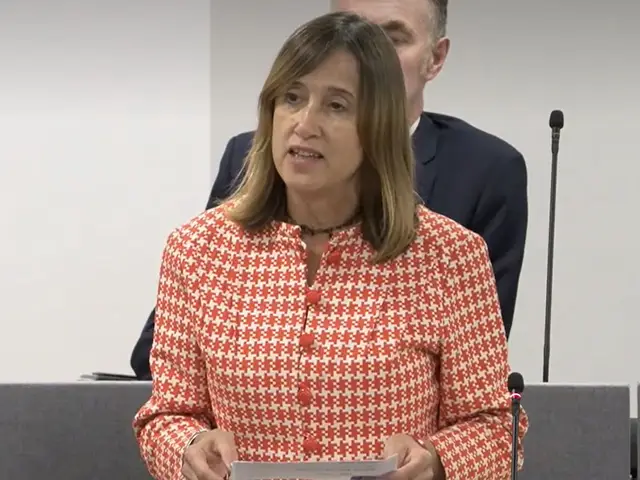Support quality, independent, local journalism…that matters
From just £1 a month you can help fund our work – and use our website without adverts. Become a member today

Opposition politicians have quizzed Wales’ health secretary after the Welsh Government unveiled the biggest change to NHS dental contracts in decades.
James Evans, the Conservatives’ shadow health secretary, warned of “big gaps” in clarity about funding, access, and accountability following the Welsh Government announcement.
After a public backlash, the Welsh Government backtracked on plans to allocate a dentist for each check-up and patients will now remain with their existing family practice.
Mr Evans welcomed the U-turn, which was prompted by a consultation that more than 6,400 people responded to, but called for safeguards to ensure people can see the same dentist. He raised concerns older people and those in rural Wales could “slip through the cracks”.
Under the reforms, NHS dentists in Wales will be paid a higher hourly rate of £150, up from the £135 initially proposed, to make working for the health service more attractive.
‘Alarm bells’

Mr Evans urged ministers to publish full details of the fee structure, warning more dentists will walk away if they are not properly rewarded and patients will pay the price.
He said: “Dentists are already overstretched and burnt out… surveys show 42% of dentists were unwilling to work under the old NHS contract and 72% said they will not sign up to the new proposed reforms as they stand. And I think that should set alarm bells ringing.”
Jeremy Miles, Wales’ health secretary, stressed that continuity of care would be a feature of the new contract and complexity will be reflected in the different rates for work.
He said the 72% figure must refer to the initial plans rather than that day’s announcement.
Automatic six-month check-ups for NHS dental patients will be scrapped in Wales from April 2026 in a move designed to free up appointments for those most in need. Instead, patients with good oral health will be recalled by dentists every 18 to 24 months.
‘Shut out’

Mabon ap Gwynfor, Plaid Cymru’s shadow health secretary, agreed with the core principle of ensuring access to dentistry regardless of income, background or location.
Mr ap Gwynfor warned of a six-year delay in bringing forward meaningful reform, resulting in dozens of dentists handing back contracts and patients suffering.
“Few would argue with the need for change,” he said, describing the “unit of dental activity” system used to calculate dentists’ pay as unfit for purpose. “But the way in which this government has handled reform leaves much to be desired.
“Instead of a negotiated settlement, I’m concerned the terms have been one-sided with the British Dental Association effectively shut out of meaningful discussions for the best part of a year. That isn’t partnership – it undermines trust and damages morale further.”
Cautioning that the “devil will be in the detail”, Mr ap Gwynfor expressed concerns about 24-month check-ups potentially leading to problems being caught too late.
‘Dental deserts’

Mr Miles told his opposite number: “It’s a negotiated contract, it will never lead to a situation where every party gets exactly what they want.”
He stressed that scrapping six-month check-ups is based on clinical evidence, such as Nice guidelines, rather than the economics of the contract. He said clinical judgements will be in the hands of the professionals who will decide when a patient needs to be called back.
Welsh Liberal Democrat leader Jane Dodds welcomed the “long-overdue” commitment to reforming dentistry and a focus on prevention but warned of dental deserts in rural Wales.

The Conservatives’ Peter Fox backed the reversal following teething problems but he questioned how the Welsh Government got the initial proposals “so blindingly wrong”.
He raised warnings from dentists that they will still have to provide NHS services at a loss, asking: “If dentists can’t recover their basic costs, how can we retain local practices?”
‘Demoralising treadmill’
In his statement on September 23, Mr Miles said the current dental contract prioritises neither need nor prevention – paying dentists to stay on a “demoralising treadmill”.
Wales’ health secretary told the Senedd: “Change is not just necessary – it is urgent,” as he outlined contract reforms which he described as the most significant change in two decades.
Mr Miles, who last week announced he will stand down at May’s Senedd election, said the new contract will make NHS dentistry charges simpler and fairer.
Under the new system, patients will pay 50% of their treatment value with a maximum cap of £384 but about half of the Welsh population will remain exempt from NHS dental charges.
“These reforms are about people, not just contracts and systems,” said Mr Miles. “The new dental contract is about making sure every person in Wales – regardless of their background or their postcode – can get the care they need when they need it.”
Support quality, independent, local journalism…that matters
From just £1 a month you can help fund our work – and use our website without adverts.
Become a member today
